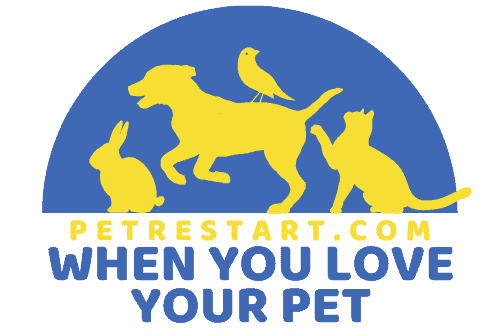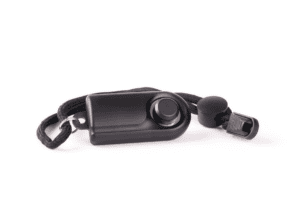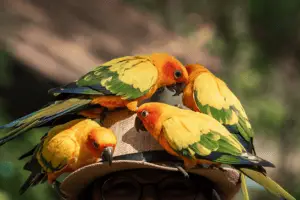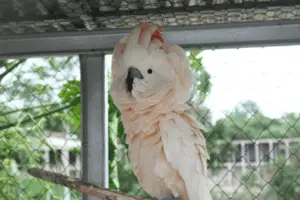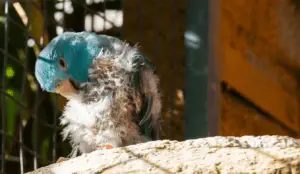Conure is a generic term for small and medium-sized South and Central American parrots with long tails. These birds are known for their shrill calls, intelligence, and beauty. However, they also tend to be noisy, territorial, and jealous. Nevertheless, they can also be excellent pets provided when trained consistently.
Conures in the wild eat high proportions of different fruits. They even like pineapple. However, most species tend only to eat the seeds within the fruit, not the pulp. Additionally, few species only consume dry seeds, whereas most consume half-ripe seeds.
Conures nowadays are given readily accessible types of fruit, vegetable, and pellets (e.g., from supermarkets) as many are in captivity or housed as pets.
It is safe for conures to eat pineapple. pineapple is a nutritious and beneficial fruit. It can serve as an excellent supplement to deficiencies encountered by an ill conure.
Benefits Of Feeding Pineapples To Conures
Pineapple is a healthy fruit, and all parts of it are edible to conures. Pineapples provide vitamins, minerals, water, and fiber. The fruit aids in enticing birds to consume more as they feed.
However, it is best to serve fresh pineapple than canned or dried ones. Canned or dried pineapples contain lots of preservatives and sugar, which is not good for your conure.
Vitamin Sources
Vitamins are essential in the maintenance of body functions and protection from various illnesses. In birds, multivitamins can be added to their diet, preferably twice a week.
Pineapples Are Sources Of The Following Specific Vitamins
- Niacin
- Vitamin B6
- Vitamin K
- Vitamin C
- Vitamin A
Parrots, in general, are prone to several deficiency syndromes. Vitamin A is essential for growth, good vision, and maintenance of mucus membranes. However, birds with vitamin A deficiency pertain to respiratory and alimentary tract diseases. Supplementation of such vitamins through fruits is vital to address such conditions. (source)
Parrots experiencing liver diseases would need dietary supplements of Vitamin C. Additionally, Vitamin C is excellent in inducing wound healing, blood clots, and strong bones.
Mineral Sources
Pineapples contain the following minerals:
- Calcium
- Phosphorous
- Potassium
- Magnesium
Calcium deficiency in birds may suggest disease in the reproductive or central nervous systems. Hence, fruit supplements and multivitamins containing calcium are vital in confronting the illness. (source)
Hydration From Pineapple
Pineapple has a high liquid content. It can aid in hydrating pet birds by giving them as a snack.
Do Conures Like Pineapple?
Many birds consume pineapple. Although, regarding their individual preferences and behaviors, some birds might love pineapples while others won’t. Nevertheless, birds adore the sweetness of pineapples.
There are various creative ways to serve pineapples to conures. One is for distraction. The owner may attach a piece of pineapple to an edge of a cage; it will entertain the pet conure for a while. Another is to provide positive reinforcement every time a conure performs behavioral tricks.
Importantly, ensure that no leftover pineapple remains on any part of the cage or within reach of the conure. As a fruit, food spoiling happens fast and may induce an upset stomach.
Diet Of Conures In Captivity
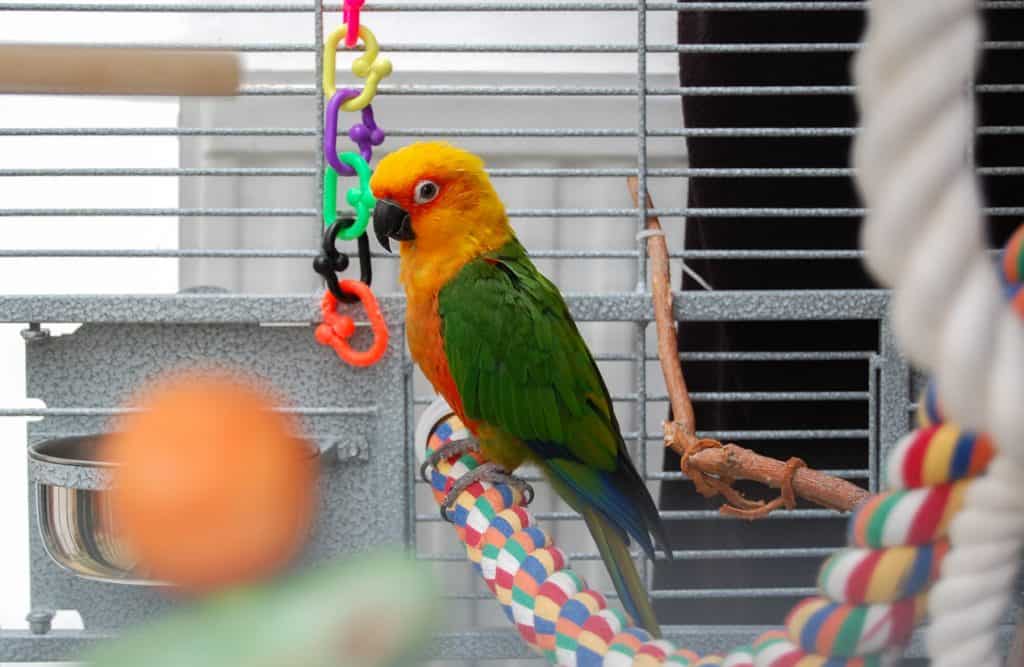
Animals need carbohydrates, protein, and fat. Parrots require diets having 20% protein, and you should balance vegetarian diets to avoid significant deficiencies which can induce illness. Dietary deficiency is a critical factor in determining the bird’s life-long health. (source)
Additionally, conures are susceptible to Conure Bleeding Syndrome (CBS) (This is where a conure bleeds excessively. The cause is unknown, but it happens when they are hurt). A conure’s diet should be high in calcium, and Vitamin K. Most conures can live up to 20 years or more if healthy.
Conures should be fed and provided with clean water twice per day. Importantly, these birds should maintain a balanced diet to ensure proper nutrition. Their diet should be composed of the following groups: (source)
- Pellets
- Vegetables
- Fruits
- Seeds, nuts, and grains
Pellets
Pellets should be the main component of a conure’s diet (i.e., 60-70%). The pellets already constitute excellent protein content and fruit sources. Ensure to have organic or natural pellets to avoid exposure of the conure to harmful preservatives or additives. Selecting a bird pellet with various colors can keep the conure interested.
Vegetables And Fruits
Vegetables and fruits should only constitute approximately 20% of the diet. The addition of this group serves only as a supplement, and it is essential to improve the conure’s nutrient intake. The group also adds a variety of flavors. Ensure to wash fruits and veggies to remove pesticides and dice them for easy consumption of the conure.
Birds receiving fresh veggies and fruits tend to have more energy, fewer behavior problems, and fewer health issues.
Seeds, Nuts, And Grains
Ultimately, the seeds, nuts, and gains should constitute the least amount of the diet. This group practically adds variety, flavor, and nutrition to the diet. You may incorporate seeds with pellets most of the time. However, grains and nuts should only be in small amounts. Ensure to have unshelled nuts, as these can be toxic to conures.
What Fruits And Vegetables Can Conures Eat?
Naturally, conures eat a wide variety of fruits, vegetables, and seeds, whereas conures in captivity greatly depend on their caretaker or owner for their food.
However, captive birds are less active compared to wild birds. Consequently, it is essential to consider the amount of fruit and vegetables to be provided on captive or pet conures as it may lead to excess weight gain and eventual health problems.
Fruits That Pet Conures Can Eat
- Pineapple
- Passionfruit
- Cherries
- Kiwi
- Mango
- Apricots
- Peaches
- Plums
- Melons
- Pears
- Bananas
- Papaya
- Figs
- Pomegranate
- Nectarines
- Guava
- Grapes
- Apples
- Berries
- Limes (in moderation)
- Lemons (in moderation)
- Oranges (in moderation)
- Tomatoes (in moderation)
Fruits begin to spoil after a few hours. Ensure to dispose of fruit leftovers, and food bowls should be cleaned and disinfected to prevent bacteria build-up.
Vegetables Pet Conures Can Eat
- Collard greens
- Chard
- Spinach
- Kale
- Watercress
- Turnip
- Greens
- Broccoli
- Cauliflower
- Cabbage
- Brussel sprouts
- Red peppers
- Sweet potato (cook before feeding)
- Yams
- Carrots
- Pumpkin
- Winter squash
- Legumes (cook before feeding or sprouting)
- Asparagus
- Eggplant
- Rutabaga
- Radishes
- Okra
- Green peppers
- Peas
- Green beans
- Cucumbers
- Zucchini
- Corn (in moderation)
- Potatoes (in moderation and cook before feeding)
Feeding Tips
Ensure to provide the daily recommended amount of food to conures. Overfeeding them would result in obesity and compromised health. (source)
Dispose of old or spoiled food. Leftovers tend to promote bacteria build-up when left for a long time. However, pellets and seeds can last for several days, whereas fruits and vegetables spoil within several hours. Hence, checking the cage and food bowl regularly for leftovers and cleaning is imperative.
What To Do With Picky Eaters
There are instances when pet conures can be picky eaters, especially for a newly introduced fruit or vegetable. The recommended time to offer a new type of food is when the pet is hungry and awake in the morning. Another option is by demonstration from the owner. Pet birds tend to follow what their owners eat.
Ensure to provide fresh food during serving. Pet conures tend to be discouraged by non-fresh food. Additionally, try to mix various fruits and vegetables, as this would entice bird pets to eat more.
To encourage them to perform behavioral tricks, feeding or providing snacks can be positive reinforcement for conures. It would also keep conures stimulated.
What Fruits Can Conures Not Eat?
Avocado
Persin is a natural fungicide in small quantities contained in avocados. This fungicide can induce respiratory or heart problems in birds. There are instances that some birds had sudden allergy-like attacks without initial signs of respiratory or heart issues. (source)
Toxic Cyanide Of Fruit Seeds And Pits
The apple seeds and pits from plum, cherry, peach, and apricot contain toxic cyanide. Ensure removal of these parts for safety before feeding conures. (source)
Highly Acidic fruits
Citrus fruits (i.e., limes, lemons, and oranges) are to be given in moderation to conures as high acidity can be harmful. (source)
Tomatoes
Tomatoes belong to the nightshade family, which are toxic plants. Conures can consume the fruit; however, you should exclude any stems or leaves before feeding. (source)
Other Food To Avoid For Conures
There are instances when undesired food can slip into the mouth of our pets. As for conures, this may happen due to their curiosity to bite on things.
Chocolate And Caffeine
Dark solid chocolate containing theobromine can induce increased heart rate when consumed by birds and may result in seizures and death. Caffeinated coffee has a similar effect. Hazardous effects pertain to the stronger consumption of chocolate or coffee. (source)
Alcohol
Consumption of alcohol leads to liver damage in birds as in humans. (source)
Onions And Garlic
Like cats and dogs, onions can induce red blood cell breakdown to conures leading to anemia or onion poisoning, whereas garlic can promote digestive issues. (source)
Meat
Naturally, conures are not meat-eaters. Meat contains saturated fat and cholesterol. (source)
Dairy
Conures are not capable of digesting lactose in dairy products. Dairy consumption would induce diarrhea and other digestive problems. (source)
Fried And Junk Food
Fried and junk food would yield high salt content when given in large and uncontrolled amounts to conures. It can cause severe and numerous health issues. (source)
What to Do If Your Conure Accidentally Eats Bad Food?
If any food mentioned above can contact bird pets, take action as soon as possible.
You may follow these steps:
- Assess the bird’s condition (e.g., signs of heavy breathing, seizures, or bleeding).
- If possible, stabilize (i.e., provision of water controlling seizures, CPR, carrying the bird outside for a breath of fresh air, etc.) the bird and remove toxic food or substance near the vicinity.
- Communicate and consult with an avian veterinarian to determine the following steps to handle the bird and ensure its health.
On the other hand, there are early warning signs when a bird is not doing well on its diet. Feather plucking (i.e., self-plucking of feathers) and diarrhea indicate a poor diet.
However, it is vital to determine whether an avian veterinarian is nearby. This type of veterinarian specializes in birds and differs from a general veterinarian practitioner. It is imperative to have close communication with an avian vet.
Summary
Overall, consuming pineapple is safe for conures. It has various benefits by providing vitamins, minerals, and hydration. You may supplement diseases associated with Vitamin C and D deficiencies using pineapple mixed with other fruits, vegetables, seeds, and pellets.
Captive conures need a balanced diet as they are sedentary relative to wild populations. Additionally, conures are prone to CBS; therefore, food supplements must be a part of their diet. In particular, a mixture of pellets, vegetables, fruits, and nuts would make them healthier and well-behaved.
However, you must take several fruits and vegetables in moderation.
Avoiding various inappropriate food for conures such as toxic fruits would ensure their safety and health. Yet, when exposed to such food by accident, it is vital to take urgent action and consult with an avian veterinarian on the following procedures for handling the exposed pet/s.
- Thompson, Dale R. “The Joy of Conures in Aviculture.” AFA Watchbird Magazine Arhive, (1994).
- Arndt, Thomas. “Conures” AFA Watchbird Magazine Archive, (2001).
- Gonzales, Fran. “Caiques.” AFA Watchbird Magazine Archive, (1996).
- Harcourt-Brown. BSAVA Manual of Psittacine Birds. NA.
- Thompson, Dale R. “Breeding Sun and Gold-capped Conures for Color.” AFA Watchbird Magazine Archive, (1998).
- Lipsig, Alan. “The Sun Conure Experience” AFA Watchbird Magazine Archive, (1994).
- Sazhin, Michael. “Common Household Hazards to Parrots. Flappers, Vol. 7 No. 4 (2016):11-12
